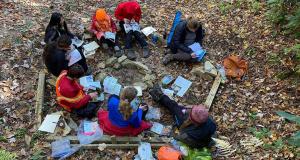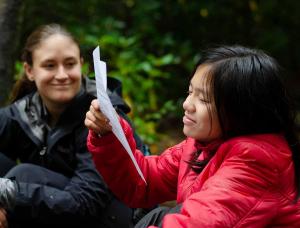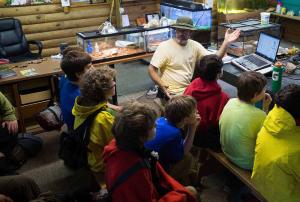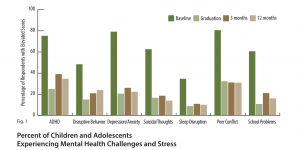Deep-Seated Issues in the Troubled Teen Industry: Trails Carolina’s Role and a Call to Action
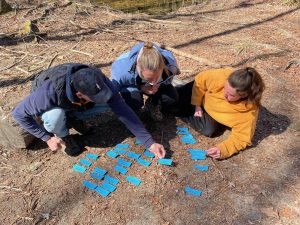
A Trails Carolina student and her parents sit on the ground outside and work on an emotional process and communication activity using flash cards.
Trails Carolina thinks program leaders should have a seat at the table.
The troubled teen industry has long been a controversial and concerning topic, particularly for parents seeking help for their children.
Encompassing a wide array of residential programs claiming to support struggling teenagers with substance abuse issues, behavioral problems, and mental health concerns, the troubled teen industry is an umbrella term that includes facilities and programs such as youth residential treatment centers, wilderness therapy programs, boot camps, and therapeutic boarding schools.
The troubled teen industry purports to offer interventions and behavioral modifications in an attempt to assist distressed children in their challenges, but many programs throughout the United States have manipulated the good faith of parents wishing to help their kids and often have ended up creating more trauma than therapy.
A closer look reveals a disturbing history filled with questionable practices, lack of oversight, and potential harm to vulnerable young individuals.
While the history of the troubled teen industry reveals something that is far from a reassuring safety net for struggling teens, it's high time we discuss it openly.
Like any stain on humanity's history, it is crucial to investigate the beginnings of the troubled teen industry to raise awareness of its flaws and dangers, enabling us to collectively work towards implementing necessary improvements and reforms for the well-being of vulnerable children and teenagers.
By shining a light on these issues, we can begin to understand what separates accredited present-day programs from the troubled teen boot camps of the past.
A Dark History
Understanding the current climate of the troubled teen industry requires a deep investigation into its problematic and often terrible history.
The origins of the troubled teen industry go back to the early 20th century with the establishment of behavior modification programs for troubled teens, also called at-risk youth or juvenile delinquents.
These programs aimed to instill discipline and compliance through strict practices that often did more harm than good.
In the 1950s and 1960s, the concept of "therapeutic communities" emerged, focusing on group therapy and counseling, but this was short-lived.
During the 1970s, a shift occurred towards more punitive methods and unregulated facilities, leading to widespread reports of abuse and neglect. The 1990s saw a surge in private residential programs marketed as therapeutic, but again, numerous allegations of mistreatment emerged.
At the core of this problem was the unregulated nature of the troubled teen industry. When these behavior modification programs and boot camps started, there was an unsettling absence of national regulations or standards to guide these facilities' operations. The lack of federal and state laws allowed them to operate virtually unchecked, leading to inconsistencies in the quality of care and treatment.
Then several years later, in 2008, the U.S. Government Accountability Office (GAO) published a report titled "Residential Programs: Selected Cases of Death, Abuse, and Deceptive Marketing," which exposed numerous allegations of abuse within residential programs across the U.S. and American-operated facilities overseas. In 1996, years before this report, the Outdoor Behavioral Healthcare Council was founded by representatives from a handful of wilderness therapy programs who believed in thorough collaboration and the creation of best practices. During that same time period, the same programs were successfully working with their State’s legislatures to create regulations and licensing to help combat programs that were not following ethical and clinical practices.
Another troubling concern was the misleading marketing tactics employed by some facilities in this sector. The boot camp brochures and curated testimonials rarely revealed the brutal realities and inefficiencies that scarred children for the rest of their lives.
Trails Carolina Is Different
In theory, the troubled teen industry should represent a beacon of hope for families navigating the stormy seas of child and teen difficulties. Unfortunately, the industry has been defined by its dark history that includes a disconcerting pattern of exploitation, lack of oversight, and questionable treatment practices, leaving programs that, in reality, are quite far from this troubled history, such as Trails Carolina, left in the shadows, and families who are in great need of help for their child left without hope.
Trails Carolina, situated in Lake Toxaway, North Carolina, is a dual-diagnosis wilderness therapy program that prioritizes youth behavioral and mental health treatment. Due to the changes that have occurred over the years, we must assess this program independently, detached from the negative reputation and dark history of the troubled teen industry.
Trails Carolina implements evidence-based practices, communication with participants and their parents, and a commitment to the mental health of struggling adolescents, unlike the harmful, unregulated programs of the past.
On Withholding Information and Outcomes
Programs used to purposely withhold information from parents about their children’s well-being and progress. Trails Carolina, however, maintains communication, providing a comprehensive view of their process.
Trails Carolina began a research study in 2014 to assess the impact of their work with youth and families. The study is facilitated by the Center for Research, Assessment, and Treatment Efficacy and the University of Arkansas. The study utilized comprehensive assessments, measuring mental health symptoms, trauma, family functioning, and treatment results. Pre- and post-treatment assessments were conducted, with follow-up surveys at 3 and 12 months after program completion. Over 1,200 families have participated, with the participants' demographics being boys and girls with an average age of 14, primarily White, with significant prior mental health service experiences.
One year after graduating from Trails Carolina, 98.9% of participants still reported a continued decrease in challenging behavior and mental health symptoms.
The Trails Carolina admissions team is available by phone to speak with concerned parents about the program.
On the Punitive Approach of Boot Camps
Another concern about the history of the troubled teen industry involves the punitive approach to discipline frequently employed by boot camps and "Scared Straight" facilities. These disciplinary approaches have repeatedly shown to be detrimental to the emotional and psychological well-being of teens.
"Scared Straight" programs and troubled teen boot camps use harmful practices, whereas the Trails Carolina wilderness therapy program adopts a therapeutic approach. Trails Carolina’s outcomes study shows that their program leads to a reduction in reported symptoms of inappropriate behavior, anxiety, and depression among their students, with effects reported to persist for up to a year after completing the program.
After leaving Trails Carolina, around 60% of students showed typical moods, compared to only 20% before treatment, and this percentage continued to rise in subsequent assessments.
On Lack of Qualifications
In addition to the dangerous lack of transparency and regulations of past troubled teen programs, as well as their use of harmful punitive measures, many of these facilities, particularly prior to the creation of state licensures, lacked qualified mental health professionals.
Today, state licensure requires wilderness therapy programs, including Trails Carolina, to operate with a full team of licensed therapists and experienced and trained wilderness instructors.
On Profit and Private Pay
Organizations claiming to want to improve the troubled teen industry spout misinformation about current programs, such as the generalized, unfounded assertion that all troubled teen programs are money-driven, keeping kids in the system to produce a profit.
Unfortunately, despite the clear effectiveness of outdoor behavioral health treatment over traditional therapy, wilderness therapy programs such as Trails Carolina continue to be private pay, with insurance companies failing to support families seeking better treatment options. Because of this, the troubled teen industry appears profit-driven, neglecting the well-being of those they serve in order to make a buck.
However, Trails Carolina, along with other present-day wilderness therapy programs, prioritizes individual and family health, striving for sustainable improvements instead of relying on repeated program enrollment.
After Trails graduation, only 43% of children and adolescents transitioned to other residential programs, such as a therapeutic boarding school (TBS) or a residential treatment center (RTC), showing greater depression and anxiety symptoms (44.4%) compared to those returning home (22.4%). This persisted during follow-up assessments, with therapeutic boarding school or residential treatment students having higher overall mental health problems (26.7%) compared to students who returned home after Trails (15.8%).
This evidence indicates that regardless of whether the children and adolescents transition to another residential treatment program or return home after completing the Trails program, they still show considerable improvements in their mental health and problematic behaviors for a full year.
If the goal of the troubled teen industry were solely profit-driven, they might encourage repeated enrollments or long-term stays in residential programs to maximize revenue. However, the fact that positive outcomes persist beyond the program completion suggests that the focus is on the well-being and successful recovery of the individuals rather than keeping them in the system for financial gain.
Moving Forward
There is a desperate need for reform in this industry. A collective effort from accrediting organizations, legislative stakeholders, parents, concerned citizens, and wilderness therapy program leadership is required to hold these facilities accountable, establish a robust regulatory framework, and ensure that the facility' primary focus is on the teens' mental, emotional, and physical well-being.
Founder of Trails Carolina, Graham Shannonhouse, states, “As program leaders, our goal is to have a seat at the table. We believe Trails Carolina, along with other wilderness therapy program leaders, should be key stakeholders in federal and state decision making, engaging with parents, concerned citizens, government legislators, and accreditation organizations to make substantial improvements in the industry for the kids and their families.”
Trails Carolina’s aim is to provide valuable context and collaborate with all stakeholders to collectively work towards evolving the industry. By advocating for industry-wide changes, implementing accountability principles, and holding themselves to high standards through licensing and accreditation, Trails Carolina sets an example of a troubled teen program dedicated to teens' mental, emotional, and physical health.
Already implementing these principles, Trails Carolina is licensed by the State of North Carolina and accredited by CARF and the Association of Experiential Education’s Outdoor Behavioral Health designation.
Upon a thorough Trails Carolina investigation, it is clear that this wilderness therapy program is committed to shifting the reality and the narrative of the troubled teen industry's dark history toward a regulated, evidence-based, child abuse free reality.
As a society, we must remember that troubled teens aren't problems to be solved but individuals who need our understanding, compassion, and effective guidance.
Julia Andrick
Trails Carolina
jandrick@trailscarolina.com
Visit us on social media:
Facebook
Twitter
LinkedIn
Instagram
YouTube
Trails Carolina Wilderness Therapy - "We Reunite Families at Trails"
Legal Disclaimer:
EIN Presswire provides this news content "as is" without warranty of any kind. We do not accept any responsibility or liability for the accuracy, content, images, videos, licenses, completeness, legality, or reliability of the information contained in this article. If you have any complaints or copyright issues related to this article, kindly contact the author above.

